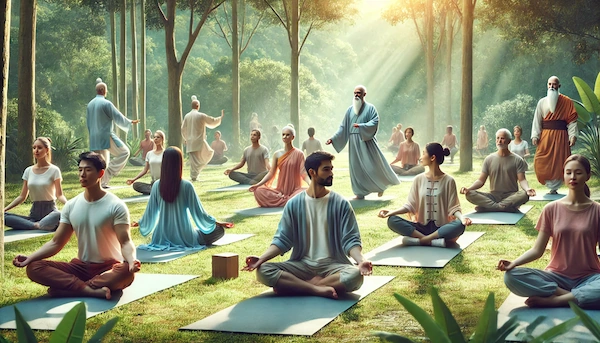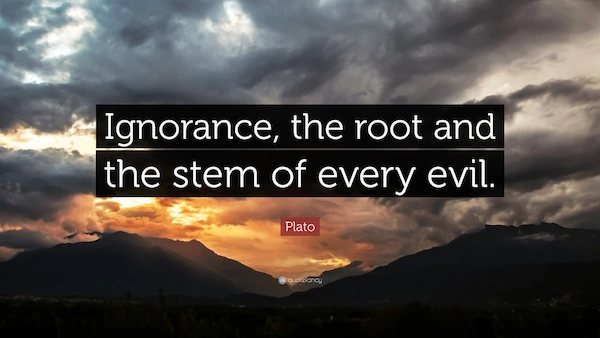
In an epoch marked by accelerated technological progress, substantial societal transformations, and mounting global pressures, the quest for spirituality is emerging as a vital component of the human experience. This article explores the multifaceted nature of spirituality, delving into its significance, its evolution, and the diverse paths individuals are taking to cultivate their spiritual lives amidst the complexities of the modern world.
Redefining Spirituality in a Contemporary Context
Spirituality, in its essence, represents a deeply personal quest for meaning, connection, and transcendence. It often extends beyond the confines of traditional religious frameworks. In 2024, this definition holds particular relevance as individuals strive to find their place in a world that is characterized by uncertainty and complexity. The rise of secularism and a decline in adherence to organized religion have prompted many to explore alternative practices that resonate more profoundly with their individual beliefs and experiences. This shift underscores a growing desire for a personalized approach to spirituality, one that aligns with individual values and lived experiences.
The Transformation: From Organized Religion to Individualized Spirituality
Historically, organized religions have served as the primary structures for understanding existence and morality. However, contemporary trends indicate a significant shift toward individualized spirituality. Many individuals are now seeking spiritual fulfillment outside of conventional religious institutions. This movement is driven by several key factors.
- Disillusionment With Traditional Institutions: Scandals and controversies within established religions have led many to question their faith and seek spiritual guidance elsewhere. This erosion of trust has fueled the search for more authentic and personally relevant spiritual paths.
- Embracing Cultural Diversity: Increased exposure to diverse cultures through globalization has encouraged individuals to explore various spiritual practices from around the world. This cross-cultural exchange of ideas enriches the spiritual landscape and offers a wider range of practices to choose from.
- The Power of Personal Experience: Many people find that personal experiences, such as meditation, nature immersion, or artistic expression, offer profound insights into their spirituality. These experiences provide direct, firsthand knowledge that often surpasses the teachings of traditional institutions.
As we move through 2024 and beyond, this trend continues to gain traction, with more individuals adopting eclectic spiritual practices tailored to their unique spiritual inclinations. This personalized approach to spirituality reflects a deep-seated desire for autonomy and self-discovery.
Key Trends Shaping Spiritual Practices in 2024
Several key trends are significantly shaping spiritual practices in 2024.
- The Integration of Technology: Technology plays a vital role in how people engage with spirituality. Virtual reality (VR) meditation sessions allow users to immerse themselves in serene environments conducive to reflection and mindfulness. Additionally, mobile applications offer guided meditations, affirmations, and community support networks that facilitate spiritual growth. Social media platforms also serve as spaces for sharing spiritual insights and connecting with like-minded individuals across the globe. Online forums enable discussions about diverse beliefs and practices while fostering a sense of community among seekers who may feel isolated in their local environments. The accessibility of these digital tools has democratized spirituality, making it easier for anyone to explore their inner lives.
- Mindfulness and Mental Health: The growing recognition of the importance of mental health has led many to incorporate mindfulness practices into their daily routines as a form of spiritual expression. Techniques such as mindfulness meditation not only promote relaxation but also enhance self-awareness and emotional resilience. In 2024, mental health professionals increasingly advocate for integrating spirituality into therapeutic practices. This holistic approach acknowledges the interconnectedness of mind, body, and spirit while empowering individuals to cultivate inner peace amid external chaos. This convergence of mental health and spirituality highlights the growing awareness of the importance of holistic well-being.
- Nature-Based Spirituality: As environmental concerns become more pressing globally, many are turning toward nature-based spirituality as a way to reconnect with the Earth. Practices such as ecotherapy encourage individuals to spend time outdoors—hiking, gardening, or simply observing natural phenomena—as a way to foster spiritual well-being. This trend reflects an understanding that nurturing our relationship with nature can lead not only to personal healing but also inspire collective action toward environmental stewardship. This emphasis on nature reflects a growing recognition of our interdependence with the natural world.
- Global Spiritual Movements: In 2024, global movements advocating for social justice intersect significantly with spiritual pursuits. Many activists draw upon spiritual principles, such as compassion and interconnectedness, to fuel their efforts toward creating equitable societies. Movements like climate justice or racial equality often emphasize the importance of collective consciousness—a shared awareness that transcends individual differences—and call upon participants to engage spiritually in their activism. This integration of social activism with spiritual values underscores the role of spirituality in shaping a more just and equitable world.
Challenges and Pitfalls on the Spiritual Path
While the pursuit of spiritual evolution offers numerous benefits, it is not without challenges.
- Information Overload: The abundance of information available online can lead seekers down conflicting paths or create confusion about authentic practices. Navigating this information overload requires critical thinking and discernment.
- Commercialization: As spirituality becomes trendy, there is concern over commodification, where genuine practices are diluted for profit. This commercialization can undermine the authenticity and integrity of spiritual practices.
- Isolation: Despite technological connectivity, many still experience feelings of loneliness or disconnection from others on similar journeys. Finding genuine community remains a key challenge for many spiritual seekers.
Navigating these challenges requires discernment and intentionality. Seekers must remain grounded in their values while exploring diverse avenues for growth. It is important to prioritize practices that resonate deeply with one’s own experiences and beliefs.
Conclusion: A Personal Journey Towards Wholeness
Ultimately, the pursuit of spirituality in 2024 can be understood as an ongoing voyage toward wholeness, a quest for self-understanding within the broader framework of existence. As individuals embrace personalized paths enriched by technology and community engagement, while remaining mindful of potential pitfalls along the way, their journeys illuminate new possibilities for connection both within themselves and with others around them. By fostering open-minded exploration alongside critical reflection on one’s beliefs, spiritual seekers can cultivate deeper meaning amidst life’s complexities while contributing positively toward collective human flourishing. This journey is not about reaching a destination, but rather about the continuous process of self-discovery and inner growth. The pursuit of spirituality is an intensely personal undertaking, and each individual’s path will be unique and shaped by their own experiences, beliefs, and values.
ARE YOU LIVING IMMERSED IN DUALITY?
Read the statements below and select those that resonate with you.
Note the number of selected boxes and see the associated profile.
0: Duality doesn’t really belong to you
1-2: There is a little bit of Duality in you
3-4: You are heavily influenced by Duality
5-6: You are fully immersed in Duality
📚 Academic Bibliography
🔬 Contemporary Spirituality Studies
Heelas, Paul, and Linda Woodhead. The Spiritual Revolution: Why Religion is Giving Way to Spirituality. Blackwell Publishing, 2005.
Lynch, Gordon. The New Spirituality: An Introduction to Progressive Belief in the Twenty-First Century. I.B. Tauris, 2007.
Partridge, Christopher. The Re-Enchantment of the West: Alternative Spiritualities, Sacralization, Popular Culture, and Occulture. T&T Clark, 2004.
Fuller, Robert C. Spiritual, But Not Religious: Understanding Unchurched America. Oxford University Press, 2001.
Roof, Wade Clark. Spiritual Marketplace: Baby Boomers and the Remaking of American Religion. Princeton University Press, 1999.
💻 Digital Spirituality and Technology
Campbell, Heidi A., and Stephen Garner. Networked Theology: Negotiating Faith in Digital Culture. Baker Academic, 2016.
Hoover, Stewart M., and Einar Örn Einarsson. “Media, Spirituality and Social Change.” Continuum, vol. 30, no. 6, 2016, pp. 644-655.
Cheong, Pauline Hope, et al. “Digital Religion, Social Media and Culture Perspectives.” New Media & Society, vol. 14, no. 1, 2012, pp. 3-12.
Fischer-Nielsen, Peter, Stefan Gelfgren, and Morten Høybye. Digital Religion: Understanding Religious Practice in Digital Media. Routledge, 2020.
Campbell, Heidi A. Digital Religion: Understanding Religious Practice in New Media Worlds. Routledge, 2013.
🧠 Mindfulness and Mental Health Integration
Kabat-Zinn, Jon. Wherever You Go, There You Are: Mindfulness Meditation in Everyday Life. Hyperion, 2005.
Williams, Mark, and Danny Penman. Mindfulness: An Eight-Week Plan for Finding Peace in a Frantic World. Rodale Books, 2011.
Goleman, Daniel, and Richard J. Davidson. Altered Traits: Science Reveals How Meditation Changes Your Mind, Brain, and Body. Avery, 2017.
Siegel, Daniel J. The Mindful Brain: Reflection and Attunement in the Cultivation of Well-Being. W. W. Norton & Company, 2007.
Pargament, Kenneth I. Spiritually Integrated Psychotherapy: Understanding and Addressing the Sacred. Guilford Press, 2007.
🌍 Nature-Based and Ecological Spirituality
White, Lynn Jr. “The Historical Roots of Our Ecological Crisis.” Science, vol. 155, no. 3767, 1967, pp. 1203-1207.
Berry, Thomas. The Dream of the Earth. Sierra Club Books, 1988.
Tucker, Mary Evelyn, and John Grim. Religion and Ecology: Can the Climate Change?. Daedalus, 2001.
Taylor, Bron. Dark Green Religion: Nature Spirituality and the Planetary Future. University of California Press, 2010.
Gottlieb, Roger S. A Greener Faith: Religious Environmentalism and Our Planet’s Future. Oxford University Press, 2006.
📖 Sociological Foundations
Durkheim, Emile. The Elementary Forms of Religious Life. Translated by Carol Cosman. Oxford University Press, 2001. [Originally published 1912]
Weber, Max. The Sociology of Religion. Translated by Ephraim Fischoff. Beacon Press, 1993.
Bellah, Robert N., et al. Habits of the Heart: Individualism and Commitment in American Life. University of California Press, 2007.
Giddens, Anthony. Modernity and Self-Identity: Self and Society in the Late Modern Age. Stanford University Press, 1991.
Berger, Peter L. The Sacred Canopy: Elements of a Sociological Theory of Religion. Anchor Books, 1990.
🌐 Globalization and Spiritual Diversity
Beaman, Lori G. Religion and Canadian Society: Contexts, Identities, and Strategies. Canadian Scholars’ Press, 2017.
Csordas, Thomas J. Transnational Transcendence: Essays on Religion and Globalization. University of California Press, 2009.
Tweed, Thomas A. Crossing and Dwelling: A Theory of Religion. Harvard University Press, 2006.
Robertson, Roland. “Glocalization: Time-Space and Homogeneity-Heterogeneity.” Global Modernities, edited by Mike Featherstone, Sage Publications, 1995, pp. 25-44.
Appadurai, Arjun. Modernity at Large: Cultural Dimensions of Globalization. University of Minnesota Press, 1996.
⚖️ Spirituality and Social Justice
West, Cornel. Prophesy Deliverance!: An Afro-American Revolutionary Christianity. Westminster John Knox Press, 2002.
Gutierrez, Gustavo. A Theology of Liberation: History, Politics, and Salvation. Orbis Books, 1988.
hooks, bell. All About Love: New Visions. William Morrow Paperbacks, 2000.
Palmer, Parker J. Healing the Heart of Democracy: The Courage to Create a Politics Worthy of the Human Spirit. Jossey-Bass, 2011.
Wallis, Jim. God’s Politics: Why the Right Gets It Wrong and the Left Doesn’t Get It. HarperOne, 2005.
📊 Empirical Research and Survey Data
Pew Research Center. “The Future of World Religions: Population Growth Projections, 2010-2050.” Pew Research Center, April 2, 2015. www.pewforum.org.
Gallup International. “Global Index of Religiosity and Atheism.” Gallup International, 2012-2023 Annual Reports.
General Social Survey. “Religious Landscape Study.” NORC at the University of Chicago, 1972-2023.
Barna Group. “State of Spirituality in America.” Barna Research, Annual Reports 2020-2024.
American Psychological Association. “Stress in America: Generation Z.” APA Surveys, 2018-2024.
🧘 Psychology of Religion and Consciousness Studies
James, William. The Varieties of Religious Experience. Harvard University Press, 1985. [Originally published 1902]
Jung, Carl Gustav. Psychology and Religion. Yale University Press, 1938.
Maslow, Abraham H. Religions, Values, and Peak-Experiences. Penguin Books, 1994.
Allport, Gordon W. The Individual and His Religion. Macmillan, 1950.
Wulff, David M. Psychology of Religion: Classic and Contemporary. 2nd edition. John Wiley & Sons, 1997.
🔍 Philosophical Foundations
Taylor, Charles. A Secular Age. Harvard University Press, 2007.
Heidegger, Martin. Being and Time. Translated by Joan Stambaugh. SUNY Press, 2010.
Levinas, Emmanuel. Totality and Infinity: An Essay on Exteriority. Translated by Alphonso Lingis. Duquesne University Press, 1969.
Marcel, Gabriel. The Mystery of Being. Translated by G.S. Fraser. Regnery, 1960.
Tillich, Paul. The Courage to Be. Yale University Press, 2000.
📱 Media and Cultural Studies
Castells, Manuel. The Information Age: Economy, Society and Culture. Volume 1: The Rise of the Network Society. Blackwell, 2000.
Turkle, Sherry. Alone Together: Why We Expect More from Technology and Less from Each Other. Basic Books, 2011.
Jenkins, Henry. Participatory Culture in a Networked Era. Polity Press, 2015.
Baym, Nancy K. Personal Connections in the Digital Age. Polity Press, 2015.
Van Dijck, José. The Culture of Connectivity: A Critical History of Social Media. Oxford University Press, 2013.
🛠️ Methodological Notes
Theoretical Framework: This analysis employs interdisciplinary methodologies drawing from sociology of religion, psychology of religion, media studies, and contemporary spirituality research to examine current trends in spiritual practice and belief.
Source Evaluation: Primary emphasis placed on peer-reviewed academic sources, longitudinal survey data, and established works in religious studies. Analysis incorporates both quantitative research findings and qualitative ethnographic studies.
Cultural Context: The analysis situates contemporary spiritual trends within the broader context of late modern society, digital transformation, environmental crisis, and social justice movements of the early 21st century.
Temporal Scope: Research focuses on developments from 2000-2024, with particular attention to post-pandemic spiritual adaptations and emerging digital religious practices.





